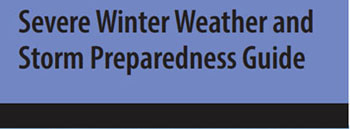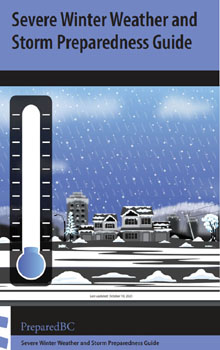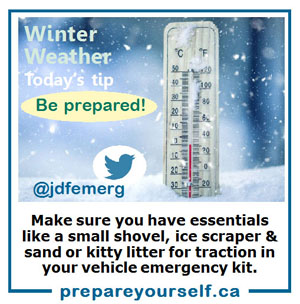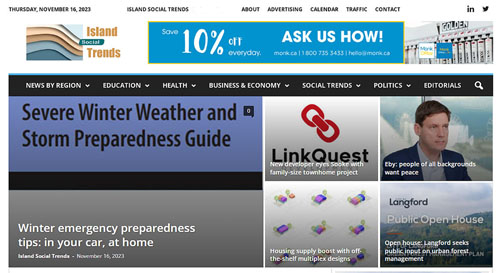Thursday November 16, 2023 | SOOKE, BC
by Mary P Brooke | Island Social Trends
Winter is coming. Here on south Vancouver Island we used to be able to count on mild winters, sometimes a full winter without snow! But that, as we know, has been changing.
Emergency readiness in your vehicle:
When out driving in your vehicle in wet conditions and cold winter weather, it’s good common sense to have not just the standard emergency kit (that you should already have) but think about things to toss in your car for even short trips.
Just in case the road gets blocked or your vehicle has trouble, and you’re on the road for longer than you think. That list might include: water bottle, snacks, extra jacket and a hat (so you can turn off your car and not waste gas or heat), another pair of boots or shoes (in case your feet get wet), phone power charger (with batteries), notepad and pen, whistle, reading material (as in not on your phone), paper towels, and the list goes on.
It’s easy to get cold quickly if you are outside in wet, cold and windy weather. Exposure to cold temperatures can lead to frostbite or hypothermia. There can be an increased risk of flooding due to melting snow.
Car-kit:
For the car itself, keep a kit in your car with items like a lightweight shovel, battery jumper cables, and a flashlight. If you drive a lightweight vehicle it might also be handy to have a heavier weight in the back — like a bag of road salt — to help your car slide less on ice.
Winter tires on your vehicle:
Does your vehicle now have winter tires on it? Still time to deal with that. Many tire shops are offering winter tire specials. Its not too late to get your vehicle ready for winter.
Winter tires provide extra traction on slippery roads and perform better in colder temperatures.
Don’t forget to check your tire pressure because the cold weather can cause more frequent decreases.
At-home emergency readiness:
By now you hopefully know the drill about having a grab-and-go bag for every member of your household, including pets! Know where they are and keep the food items and batteries up to date.
Your home emergency kit should be located in a location that you can likely reach in an emergency. Having it in a backyard shed might work for your household. Every emergency kit needs at least a seven-day supply of water for every family member and each of your pets.
Remind yourself where the extra supplies are for kitchen and bathroom. Discuss your emergency plan with household members, at least once ahead of winter.
Severe Winter Weather and Storm Preparedness Guide:
The Severe Winter Weather and Storm Preparedness Guide by PreparedBC has been updated as of October 10, 2023. Download a copy of the Severe Winter Weather and Storm Preparedness Guide 2023.
Social media tracking in emergencies:
Follow Juan de Fuca Emergency Preparedness Program on X (Twitter).
Look for the #BCStorm hashtag in social media.
Know your weather alerts:
Environment and Climate Change Canada issues a variety of severe winter
weather alerts to notify the public about hazardous winter conditions, such as:
- Arctic outflow warning (Coastal B.C.)
- Blizzard
- Flash freeze
- Freezing drizzle, freezing rain
- Snowfall
- Rainfall
- Extreme cold
The type of alert issued by Environment and Climate Change Canada depends on the severity and timing of the event, as well as the region you’re in. Learning the difference will help you understand what actions to take. It’s important to follow the weather forecast where you live.
But don’t wait for alerts. Always be prepared.
===== RESOURCES:
EMERGENCY PREPAREDNESS NEWS by Island Social Trends
PREPAREYOURSELF.CA by Capital Regional District (CRD)
JUAN DE FUCA EMERGENCY PROGRAM on X (Twitter)









